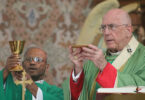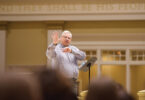Villa St. Francis joins class action lawsuit
by Joe Bollig
joe.bollig@theleaven.org
KANSAS CITY, Kan. — When presented with a Hobson’s choice of acting contrary to the Catholic faith or facing ruinous fines, Villa St. Francis chose a third option: to fight.
The Catholic Benefits Association — a coalition of nearly 200 Catholic employers and 1,000 parishes, including Villa St. Francis — filed a class action lawsuit on March 12 in the U.S. District Court for the Western District of Oklahoma.
Villa St. Francis, a Catholic not-for-profit skilled nursing facility in Olathe sponsored by the Archdiocese of Kansas City in Kansas, and other CBA plaintiffs are seeking a preliminary injunction against the contraceptive mandate part of the Affordable Care Act.
Other plaintiffs include the Archdiocese of Oklahoma City and the Archdiocese of Baltimore.
The defendants in the lawsuit are Secretary Kathleen Sebelius of the U.S. Department of Health and Human Services and other federal officials and departments.
Although it is not a plaintiff in the lawsuit, the Archdiocese of Kansas City in Kansas has an interest in this case, said Archbishop Joseph F. Naumann.
“The archdiocese joined the Catholic Benefits Association, which is the group launching the lawsuit,” said the archbishop. “The archdiocese itself is not one of the plaintiffs, but Villa St. Francis is.”
“The reason I make that distinction is because our health insurance plan for the archdiocese — which includes all of our other entities and agencies, parishes and schools, is grandfathered at this point,” the archbishop continued. “Our entities are not being affected by the mandate . . . as long as we can keep our grandfathered status, which we won’t be able to keep forever, perhaps for a couple of years.”
Villa St. Francis, for various reasons, chose not to be a part of the archdiocesan health benefits plan and thus is subject to the U.S. Health and Human Services contraceptive mandate.
The archdiocese will, however, benefit from a favorable ruling in the case, or, conversely, be burdened by an unfavorable ruling, said Colorado Springs-based attorney L. Martin Nussbaum, a partner in the law firm of Lewis Roca Rothgerber, which represents the plaintiffs.
“At the core of this law is the mandate by the federal government that all employers and insurers provide the CASC benefits — contraceptives, abortion-inducing drugs and devices, sterilization and counseling,” said Nussbaum.
The archdiocese is exempt, but burdened by the law, he said. The archdiocese must both serve and lead its affiliates in ways consistent with the Catholic faith.
“If the law prohibits them from having this second group of employers [like Villa St. Francis] that aren’t exempt in their plan, then the archdiocese can’t serve them or model the right conduct that will help them,” said Nussbaum. “The archdiocese is not a named party in the lawsuit, but it is by virtue of being a member [of the CBA] affected by the lawsuit.”
Villa St. Francis stands as a model of the kind of Catholic employers that are not exempted from the mandate, yet at the same time are a thoroughly Catholic ministry.
“The only [choice] the government has given them is to comply with the mandate or hire a surrogate to do it for them,” said Nussbaum.
“Villa St. Francis has courageously come forward to vindicate its religious freedom rights on behalf of itself and a whole large class of similarly situated Catholic ministries across the United States,” he continued. “It shows great leadership by Villa St. Francis to do this.”
Late last year, the U.S. Department of Health and Human Services offered what it called “an accommodation” to religious entities that objected to the mandate.
“It is a childlike moral analysis coming from the government, because they think [the accommodation] solves our moral dilemma,” said Nussbaum.
The “Final Rules” included a requirement for self-certification that “also has effects contrary to Catholic values,” according to the plaintiffs’ opening brief. The CASC benefits would still be provided.
“Obviously, it’s not an accommodation at all,” said Nussbaum. “It forces them to engage a surrogate to provide those benefits it condemns.”
The financial penalties for the Villa to defy the mandate would be severe.
If Villa St. Francis provides health insurance to its 100 eligible employees but refuses to include the CASC benefits, it could be fined $100 per employee per day. That comes to a fine of $36,500 per covered employee per year — or a total of more than $3.6 million a year.
“To show you how agenda-driven this law is, if Villa St. Francis declined to provide insurance to its employees altogether, the fine is $2,000 per employee per year,” said Nussbaum. “Why 18 times as much if [the Villa] gives [employees] all insurance but holds back the condoms? That’s the law.”
Another plaintiff complaint is that the mandate “creates an unprecedented government scheme of discriminatory religious classifications,” choosing religious “winners and losers,” and the government appropriating for itself the power to control and define the religious life and identity of believers.
“I’ve spent my life working around these issues,” said Nussbaum. “And I cannot find any law in American history as religiously discriminatory as this law, in terms of creating whole different classes of religion. This is discrimination among religious types.”






